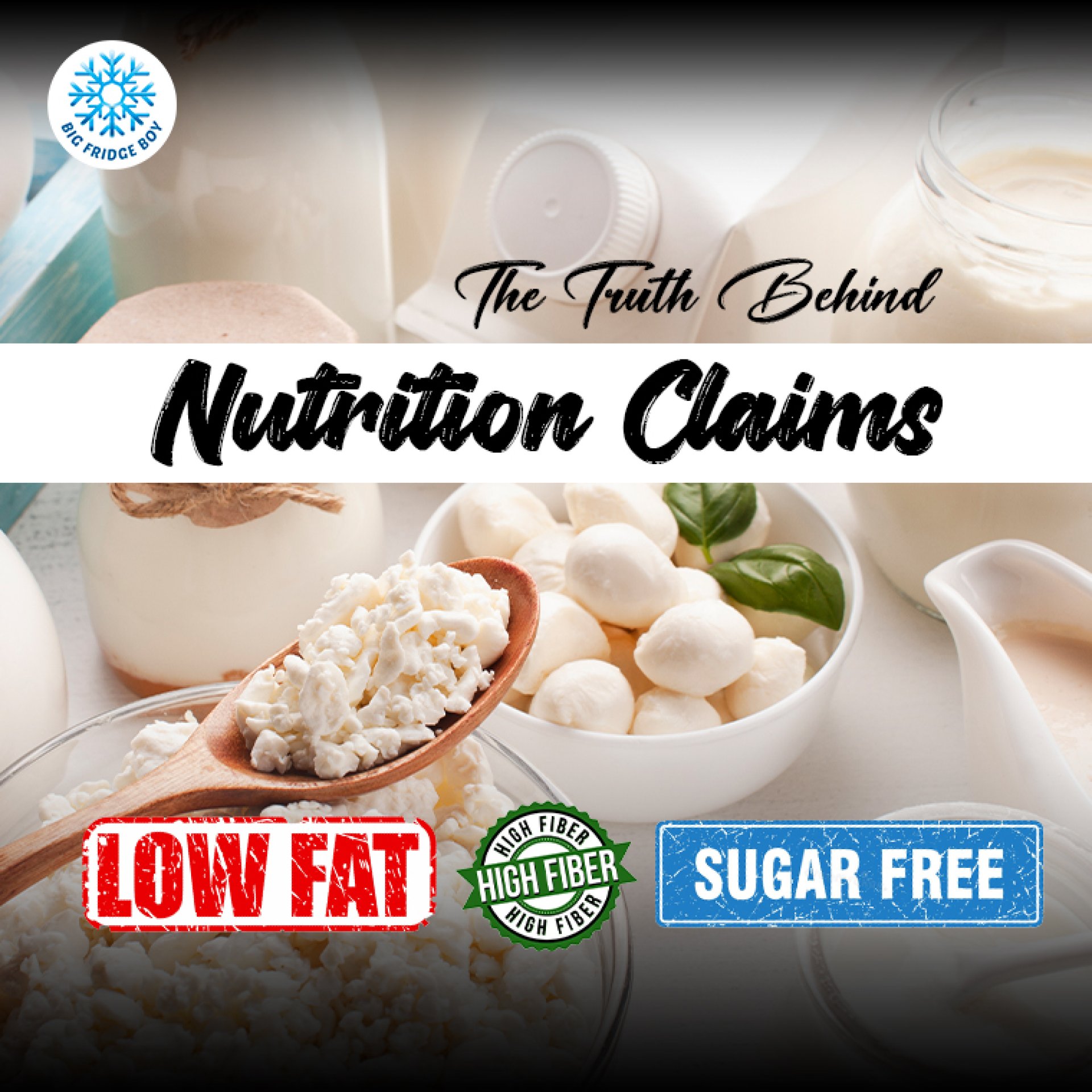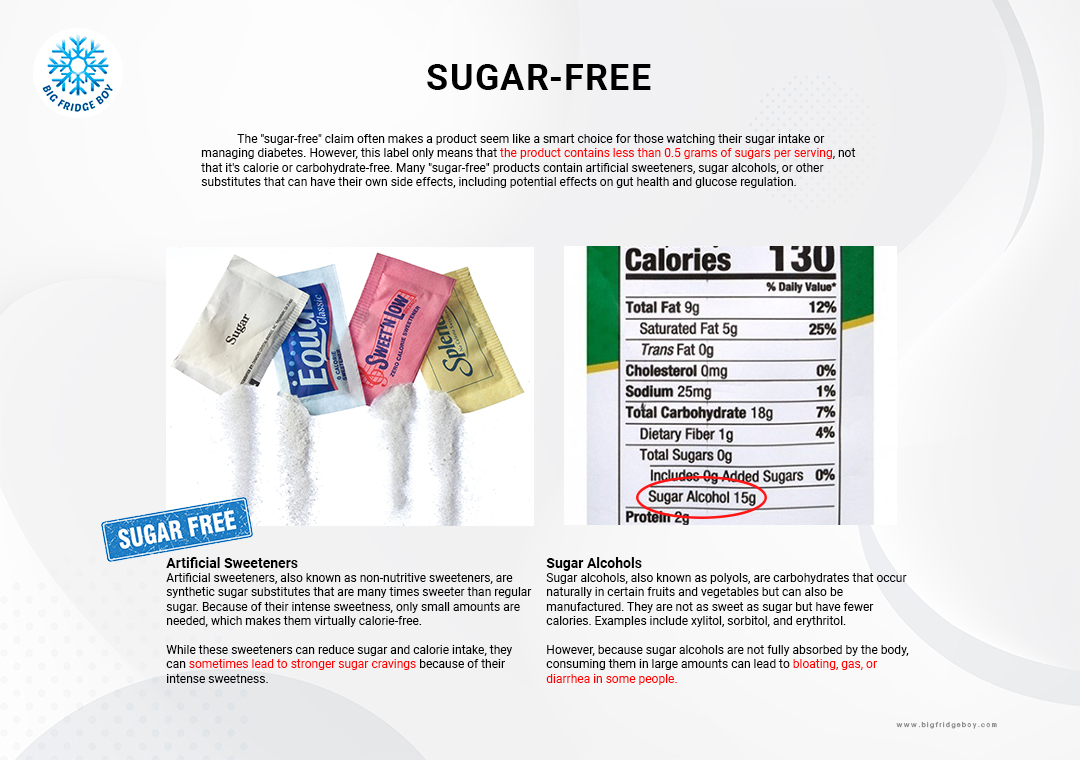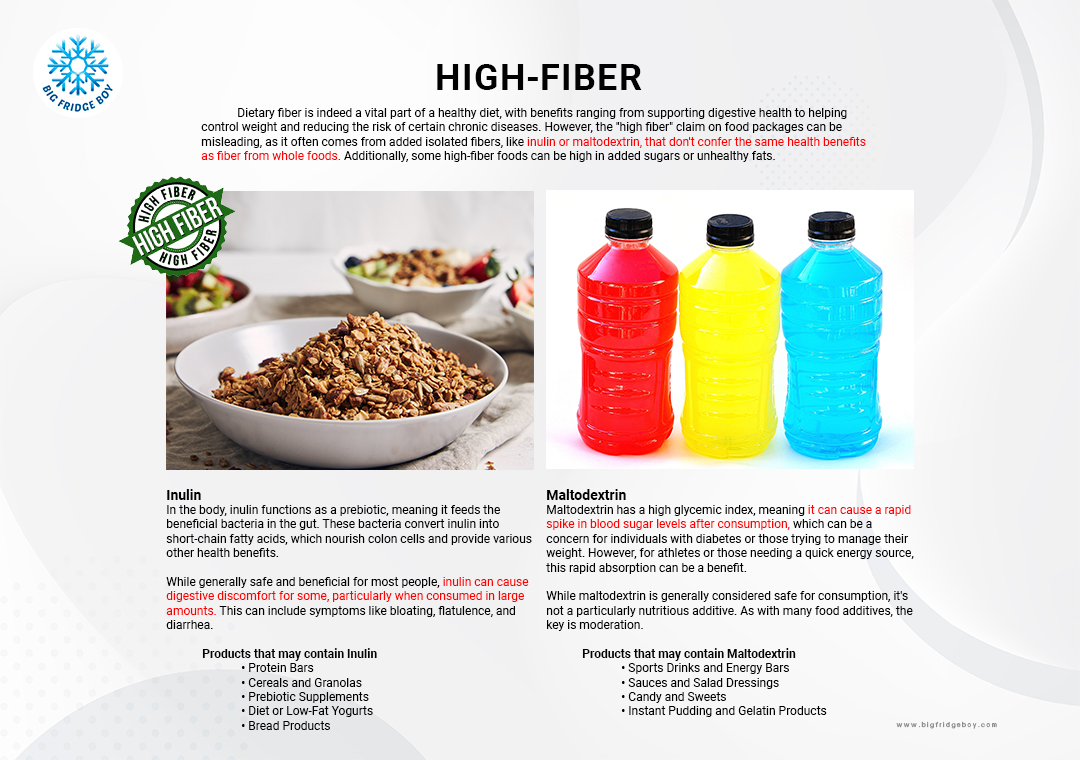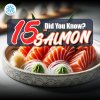The Truth Behind Nutrition Claims: "Low-Fat", "Sugar-Free", "High-Fiber"

When navigating the aisles of a grocery store, you're likely to be bombarded with brightly colored packages making bold claims of being "low fat", "sugar-free", or "high in fiber". While these claims may seem like a clear guide to healthier choices, they can sometimes be more misleading than helpful. Let's demystify these popular nutrition claims.
1 Low-Fat
Low-fat products are often seen as the healthier option, as excessive intake of fats, particularly saturated and trans fats, can lead to obesity, heart disease, and other health problems. However, a "low fat" label doesn't necessarily mean the food is low in calories or healthy. When fat is removed, it's often replaced with sugars, artificial sweeteners, or salt to keep the product tasty, which can lead to other health problems. Additionally, not all fats are bad – our bodies need healthy fats like monounsaturated and polyunsaturated fats for various functions.
2 Sugar-Free
The "sugar-free" claim often makes a product seem like a smart choice for those watching their sugar intake or managing diabetes. However, this label only means that the product contains less than 0.5 grams of sugars per serving, not that it's calorie or carbohydrate-free. Many "sugar-free" products contain artificial sweeteners, sugar alcohols, or other substitutes that can have their own side effects, including potential effects on gut health and glucose regulation.

- Artificial Sweeteners
Artificial sweeteners, also known as non-nutritive sweeteners, are synthetic sugar substitutes that are many times sweeter than regular sugar. Because of their intense sweetness, only small amounts are needed, which makes them virtually calorie-free. Examples include aspartame (Equal, NutraSweet), sucralose (Splenda), and saccharin (Sweet'N Low).
These sweeteners are often used in 'diet' or 'sugar-free' products, including diet drinks, sugar-free desserts, and gum. While they can help reduce calorie intake and control blood sugar levels, there's an ongoing debate about their health impacts. Some studies suggest potential links to health issues like metabolic syndrome and changes in gut microbiota, but the evidence is inconclusive.
It's also worth noting that while these sweeteners can reduce sugar and calorie intake, they can sometimes lead to stronger sugar cravings because of their intense sweetness. - Sugar Alcohols
Sugar alcohols, also known as polyols, are carbohydrates that occur naturally in certain fruits and vegetables but can also be manufactured. They are not as sweet as sugar but have fewer calories. Examples include xylitol, sorbitol, and erythritol.
Sugar alcohols are commonly used in sugar-free or no-sugar-added products like candy, cookies, and chewing gum. They provide fewer calories than sugar and have less of an effect on blood glucose levels, which can make them a good alternative for people with diabetes or those looking to cut down on calories.
However, because sugar alcohols are not fully absorbed by the body, consuming them in large amounts can lead to bloating, gas, or diarrhea in some people.
In conclusion, while artificial sweeteners and sugar alcohols can play a role in reducing sugar and calorie intake, they are not a magic solution for health or weight loss. As with many things related to nutrition, moderation is key. It's also important to remember that the healthiest approach to eating is to consume a balanced diet based on whole foods.
3 High-Fiber
Dietary fiber is indeed a vital part of a healthy diet, with benefits ranging from supporting digestive health to helping control weight and reducing the risk of certain chronic diseases. However, the "high fiber" claim on food packages can be misleading, as it often comes from added isolated fibers, like inulin or maltodextrin, that don't confer the same health benefits as fiber from whole foods. Additionally, some high-fiber foods can be high in added sugars or unhealthy fats.

- Inulin
Inulin is a type of dietary fiber that belongs to a class of carbohydrates known as fructans. It's found naturally in a variety of fruits, vegetables, and grains, including onions, asparagus, wheat, and particularly in chicory root, from which most commercial inulin is extracted. Inulin is often added to processed foods to boost their fiber content or to replace fat and sugar, thanks to its mildly sweet flavor.
In the body, inulin functions as a prebiotic, meaning it feeds the beneficial bacteria in the gut. These bacteria convert inulin into short-chain fatty acids, which nourish colon cells and provide various other health benefits.
While generally safe and beneficial for most people, inulin can cause digestive discomfort for some, particularly when consumed in large amounts. This can include symptoms like bloating, flatulence, and diarrhea.- Products that may contain Inulin
- Protein Bars: Many protein bars and meal replacement bars use inulin because it adds fiber without adding many calories or affecting the taste.
- Cereals and Granolas: Inulin is often added to increase fiber content.
- Prebiotic Supplements: Inulin is a popular ingredient in prebiotic supplements because it feeds beneficial gut bacteria.
- Diet or Low-Fat Yogurts: Inulin can improve the texture of these products and add sweetness without adding much sugar or calories.
- Bread Products: Inulin can be added to bread to increase its fiber content.
- Products that may contain Inulin
- Maltodextrin
Maltodextrin is a highly processed white powder that is derived from starchy foods like corn, rice, potato, or wheat. Unlike inulin, maltodextrin is not a source of fiber. It is a polysaccharide and is used as a food additive to improve the texture, flavor, and shelf-life of various processed foods. It is also used in sugar substitutes and meal replacement shakes because it's easily digestible and can quickly be converted into energy.
Maltodextrin has a high glycemic index, meaning it can cause a rapid spike in blood sugar levels after consumption, which can be a concern for individuals with diabetes or those trying to manage their weight. However, for athletes or those needing a quick energy source, this rapid absorption can be a benefit.
While maltodextrin is generally considered safe for consumption, it's not a particularly nutritious additive. As with many food additives, the key is moderation.- Products that may contain Maltodextrin
- Sports Drinks and Energy Bars: Maltodextrin provides a quick source of energy, making it popular in these products.
- Sauces and Salad Dressings: Maltodextrin can be used to thicken these products and improve their shelf life.
- Candy and Sweets: Maltodextrin can provide sweetness and improve the texture.
- Instant Pudding and Gelatin Products: Maltodextrin helps to create the desired texture in these products.
Overall, when you see inulin or maltodextrin on a food label, it's a sign that the product is likely processed. While these ingredients aren't necessarily harmful in moderation, relying primarily on whole foods for nutrition is usually the best approach for overall health.
Understanding these claims and their implications helps us make healthier food choices. Rather than relying solely on these marketing claims, take a moment to read the Nutrition Facts panel and the ingredients list. These provide more accurate information about the product's nutritional content and can give you a better idea of whether the food fits into your balanced diet.
Remember, whole foods like fruits, vegetables, whole grains, and lean proteins, which might not come with flashy labels or marketing claims, are the foundation of a healthy diet. Navigating food labels doesn't have to be tricky once you understand what they really mean.





